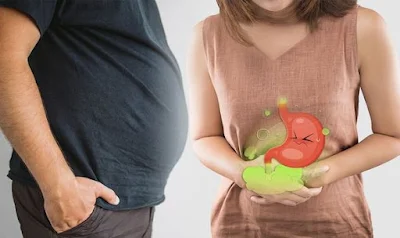Most of us have experienced bloating at some point. Excess air in your digestive tract causes belly bloating. Your stomach is swelled up and firm, your waistline is poking into you, and you may be experiencing severe gas sensations. You may also have signs of gas (flatulence), burping, or a rumbling stomach as your body attempts to expel extra air.
Bloating is quite common. Around 30% of respondents report it happens on a frequent basis. According to study
Although bloating can be a sign of a variety of medical illnesses, it is most commonly caused by gas, digestive difficulties, or nutritional causes.
Possible causes of stomach bloat:
- Food intolerance
- Several drugs
- Constipation
- Anxiety, stress, or sadness
- Crohn's disease and ulcerative colitis are both examples of inflammatory bowel disease.
- Gastrointestinal perforation
1. Beans
They are strong in protein and carbohydrates. Beans are also high in fiber and a variety of vitamins and minerals.
However, most beans include sugars called alpha-galactosides, which are part of a carbohydrate group known as FODMAPs.
FODMAPs (fermentable oligo-, di-, mono-, and polyols) are short-chain carbohydrates that escape digestion and are fermented by gut bacteria in the colon. Gas is a frequent consequence of this operation.
FODMAPs should not cause any difficulties for most individuals since they feed the good bacteria in the stomach.
Excess gas is produced during the fermentation process in many people who have irritable bowel syndrome (IBS). This can cause severe discomfort, with symptoms such as bloating, gas, cramps, and diarrhea.
Soaking and sprouting beans is an effective approach to minimize FODMAPs in beans. Changing the soaking water numerous times may also be beneficial.
2. Sugar-free meal
Both those with diabetes and those watching their calorie intake are drawn to foods with the "sugar-free" label. Foods or beverages that have less than 0.5 grams of sugar per serving are considered to be sugar-free by definition. In order to substitute sugar and offer sweetness, sugar alcohols (sorbitol, xylitol, and mannitol) and/or artificial sweeteners (aspartame, sucralose, and stevia) are typically used.
Natural sweeteners known as sugar alcohols have around half the calories of sugar; although this is fantastic, it also means that they are not entirely digested. Sugar alcohols are an absolute feast for the bacteria in your stomach, which then ferments them. Bloating and gas are caused by this fermentation.
Be cautious while eating sugar-free gum, candies, cookies, and ice cream, especially if they include sugar alcohols in them. Keep in mind that a food that is sugar-free is not always carb-free. For the total grams of carbohydrates in any food or beverage you eat, always check the nutrition facts label.
3. Sugar alcohols
In sugar-free meals and chewing gum, sugar alcohols are utilized to substitute sugar.
These include xylitol, sorbitol, and mannitol, among others.
Sugar alcohols are FODMAPs as well. Since they enter the large intestine unmodified and are consumed by the gut bacteria there, they frequently result in digestive issues.
High sugar alcohol intake may result in digestive problems such bloating, gas, and diarrhea.
4. Milk and dairy-based goods
When you were a kid, you could have remembered downing milk like water, but now days you realize that even a modest amount of milk in your cereal or a glass of milk produces bloating, gas, and sometimes even diarrhea. Your inability to digest meals that contain lactose, a kind of sugar present in milk and other dairy products, may indicate that you have a lactose intolerance.
About 30 million American adults suffer from lactose intolerance, which is highly prevalent and is brought on by low levels of lactase, an enzyme that breaks down lactose in the stomach. To be sure, you can get a lactose intolerance test from your doctor.
Try lactose-free or lactose-reduced milk in the meantime, or switch to a non-dairy "milk," such almond, rice, or soy milk (seek to select plant-based milks that are fortified with calcium and vitamin D). To aid with the digestion of lactose, you can also take a lactase supplement, which is sold over the counter. Additionally, you might discover that some dairy products, such as yogurt and hard cheeses, are easier for you to handle than milk itself.
5. Wheat
Due mostly to the presence of a protein called gluten, wheat has been the subject of intense debate in recent years.
Wheat is being consumed by a huge number of people notwithstanding the issue. Most breads, pastas, tortillas, pizzas, and baked goods including cakes, biscuits, pancakes, and waffles all include it.
Wheat can cause severe digestive issues, such as bloating, gas, diarrhea, and stomach discomfort, in persons with celiac disease or gluten sensitivity. Wheat contains FODMAPs, which some people may experience as stomach issues.
Oats, quinoa, buckwheat, almond flour, and coconut flour are just a few of the numerous gluten-free alternatives to wheat that are available.
Suggested post: Gluten-Free Nutrition: Fact or Fad?
6. Fatty food
fatty or fried foods take longer to digest. As a result, following a fatty meal, you could feel uncomfortable full and bloated. Remember to limit your quantities and balance out high-fat items with low-fat foods (like veggies).




0 Comments
Post a Comment
Share your views